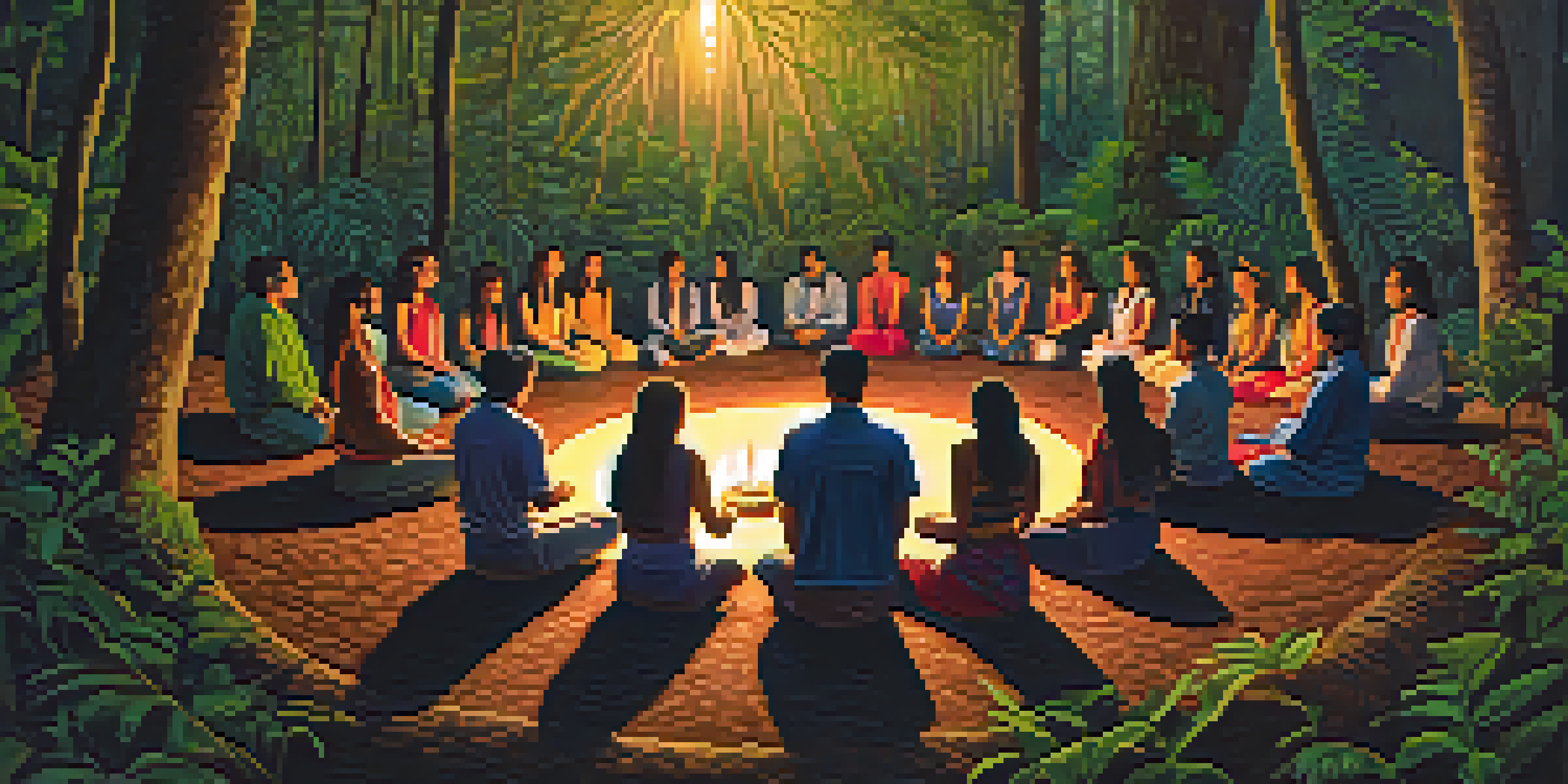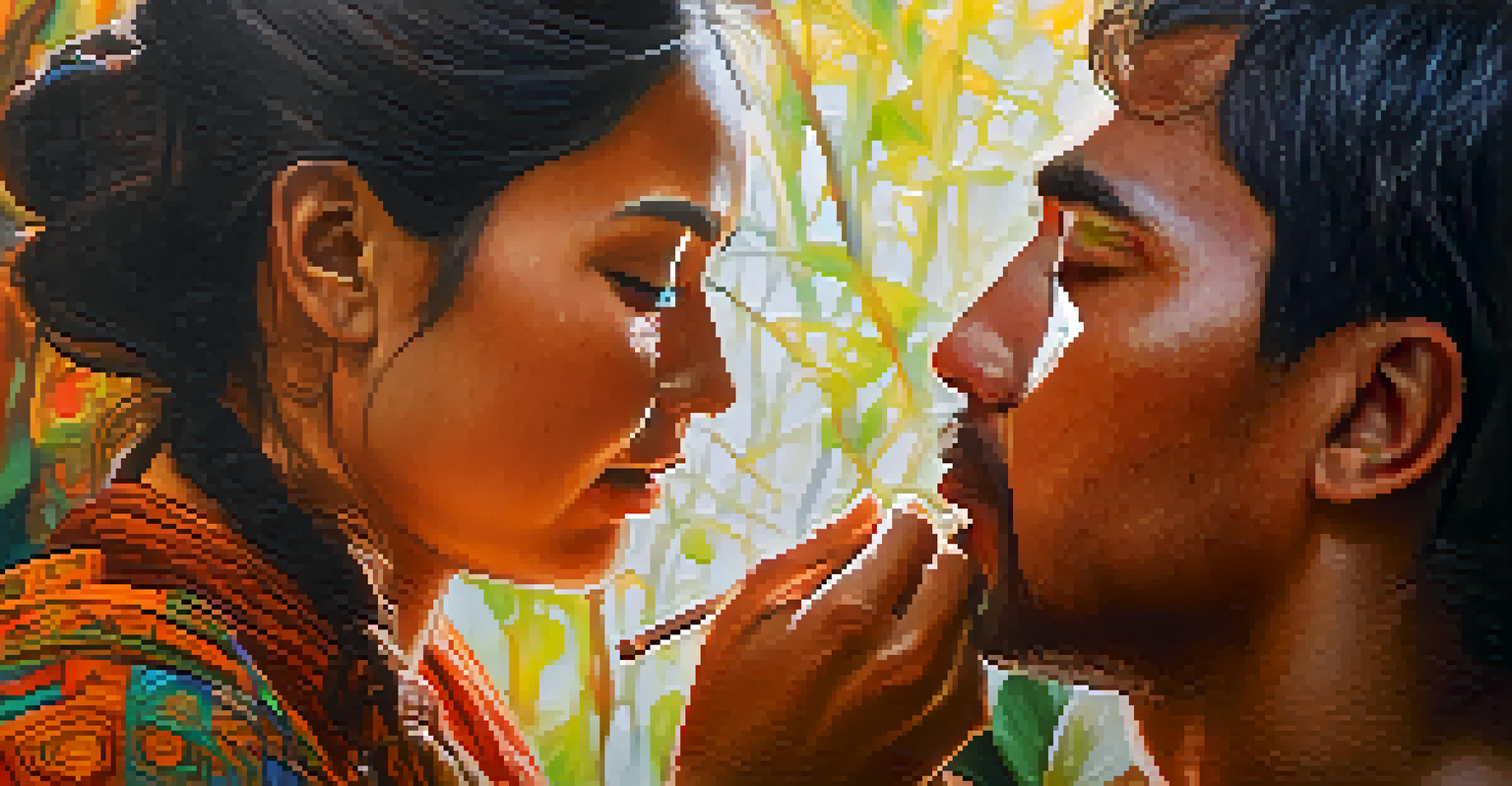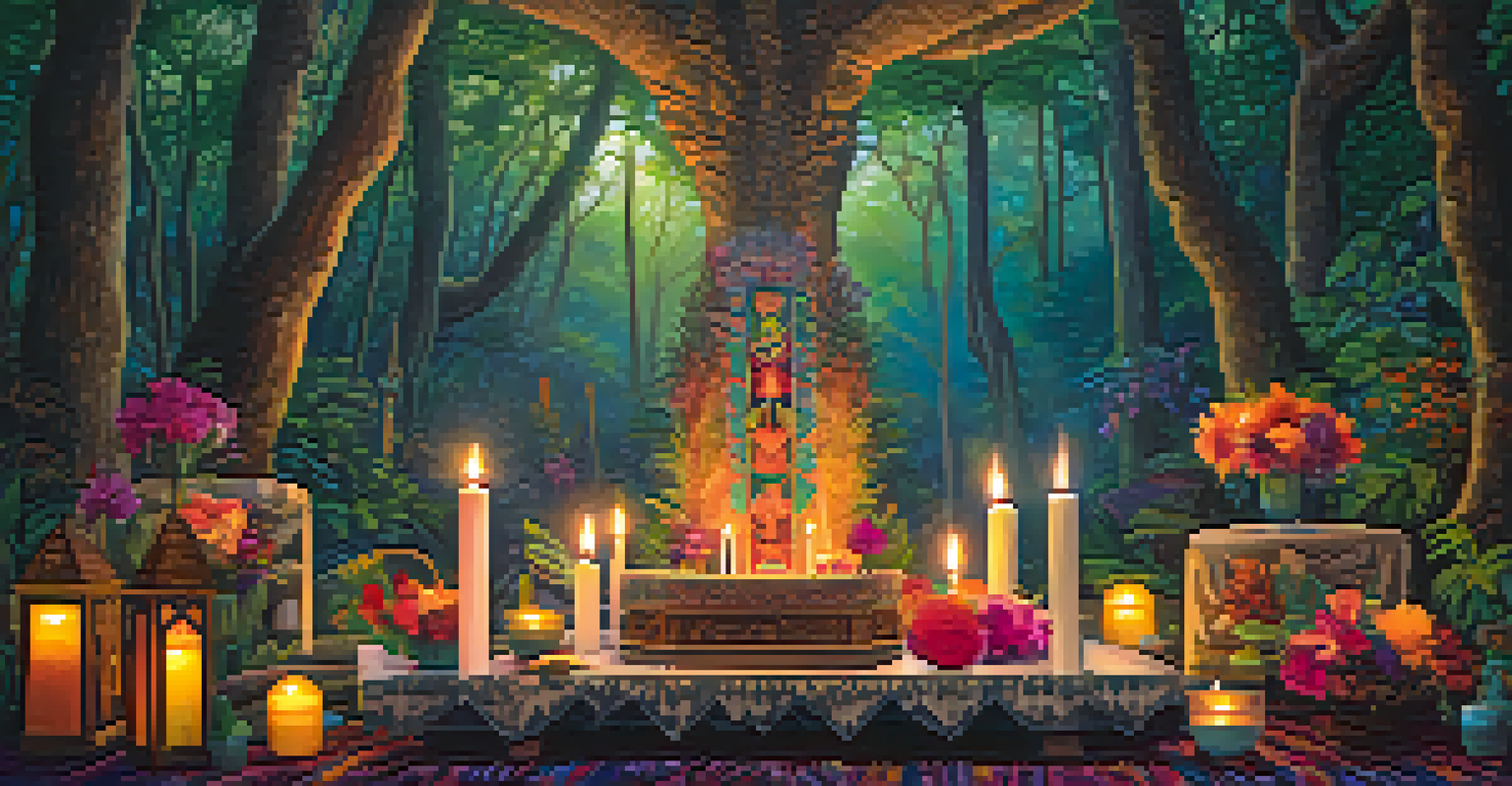Facilitator-Participant Dynamics in Ayahuasca Ceremonies

The Role of the Facilitator in Ayahuasca Ceremonies
In Ayahuasca ceremonies, the facilitator plays a crucial role in guiding participants through their experiences. This individual is often well-versed in the traditions surrounding Ayahuasca and is responsible for creating a safe and supportive environment. They lead the ceremony, offering guidance and support while ensuring that participants feel comfortable and secure.
The healer is not the one who does the healing, but the one who facilitates the healing process.
The facilitator's presence can significantly influence the tone and outcome of the ceremony. They help participants navigate the often intense emotional and psychological landscapes that arise during the experience. A skilled facilitator can foster trust and openness, enabling participants to delve deeper into their self-exploration.
Ultimately, the facilitator acts as a bridge between the spiritual and physical realms, helping to create a transformative experience. Their knowledge and intuition are invaluable as they respond to the unique needs of each participant, ensuring a harmonious flow throughout the ceremony.
Participant Expectations: What to Anticipate
Before attending an Ayahuasca ceremony, participants often have various expectations based on personal desires and experiences. Some may seek healing from past traumas, while others might be looking for spiritual insights or a sense of connection with nature. Understanding these motivations is essential, as they can shape the overall experience.

Participants should prepare themselves for a range of emotions and physical sensations during the ceremony. It's not uncommon to encounter feelings of fear, joy, or even confusion as the Ayahuasca begins to take effect. Being aware of these possibilities can help participants approach the ceremony with an open mind and heart.
Facilitators Guide Transformative Journeys
The facilitator's role is crucial in creating a safe environment and guiding participants through intense emotional experiences during Ayahuasca ceremonies.
Ultimately, managing expectations is key. While the journey can be deeply transformative, it's important to remember that every person's experience is unique, and outcomes may differ from what one anticipates.
Building Trust Between Facilitator and Participants
Trust is a foundational element in Ayahuasca ceremonies, and it often begins with the relationship between the facilitator and participants. Facilitators typically introduce themselves and explain their background, which helps establish credibility and rapport. This initial interaction sets the stage for open communication throughout the ceremony.
The greatest gift you can give someone is your own happiness, and that can only come from within.
As the ceremony unfolds, the facilitator's ability to maintain trust becomes even more critical. Participants may experience vulnerable moments, and feeling supported can make all the difference. A facilitator's compassionate presence can encourage participants to express their feelings and thoughts without fear of judgment.
By fostering an atmosphere of safety and trust, facilitators empower participants to engage fully with their experiences. This dynamic not only enhances the individual journey but also contributes to a more cohesive group experience, creating a sense of community.
The Importance of Group Dynamics in Ceremonies
Group dynamics play a significant role in the success of an Ayahuasca ceremony. Each participant brings their energy, emotions, and intentions, which can influence the collective experience. As such, the facilitator must be attuned to the group's needs, adjusting their approach to harmonize the energies present.
The interactions among participants can also shape individual journeys. Sharing insights or supporting one another can foster deeper connections and enhance the overall experience. Conversely, tension or discord within the group can lead to discomfort, making the facilitator's role in managing these dynamics crucial.
Trust Enhances Group Experience
Building trust between facilitators and participants fosters open communication, allowing for deeper connections and a more cohesive group journey.
Ultimately, a well-functioning group can amplify the effects of the ceremony, creating a profound sense of unity and shared understanding. This communal aspect is often what participants cherish most, as it reinforces the idea that they are not alone on their journey.
Navigating Challenges: Facilitator's Role in Difficult Moments
Challenges and difficult moments are common in Ayahuasca ceremonies, and the facilitator’s role becomes paramount during these times. Participants may confront deep-seated fears, unresolved trauma, or overwhelming emotions that can lead to distress. A skilled facilitator is prepared to recognize these moments and provide appropriate support.
During challenging experiences, the facilitator may offer calming techniques, such as breathing exercises or gentle reassurances, to help participants regain composure. They might also encourage individuals to express what they are feeling, creating a space for processing emotions safely.
By skillfully navigating these challenges, facilitators can turn potentially overwhelming moments into opportunities for growth. This transformative approach not only aids individual healing but also strengthens the bond within the group, fostering resilience and understanding.
The Aftermath: Integration and Continued Support
The journey doesn't end with the Ayahuasca ceremony; rather, it marks the beginning of a crucial integration phase. Participants often leave with profound insights and emotions that need to be processed and understood. Facilitators can provide tools and resources to assist in this integration process, helping participants make sense of their experiences.
Integration circles or follow-up sessions can be invaluable for participants to share their insights and feelings in a supportive environment. These gatherings foster a sense of community and help individuals articulate their experiences, leading to deeper understanding and healing.
Integration Supports Lasting Change
Post-ceremony integration is essential, as facilitators provide ongoing support to help participants process their experiences and implement insights into daily life.
Ongoing support from the facilitator can also guide participants in implementing their newfound insights into daily life. This holistic approach ensures that the benefits of the ceremony extend beyond the immediate experience, promoting lasting transformation.
Creating a Safe Space: Ritual and Environment
The physical and energetic environment of an Ayahuasca ceremony is essential for fostering safety and openness. Facilitators often curate the setting with intention, incorporating elements like music, candles, and natural surroundings to create a sacred atmosphere. This environment encourages participants to relax and fully immerse themselves in the experience.
Rituals, such as prayers or intentions set at the beginning of the ceremony, play a vital role in grounding the experience. These practices help participants align their focus and prepare for the journey ahead. The facilitator's guidance in these rituals can enhance the sense of connection and purpose within the group.

Ultimately, a well-prepared environment combined with thoughtful rituals establishes a foundation of safety. This allows participants to explore their inner landscapes with confidence, fostering deeper insights and healing.